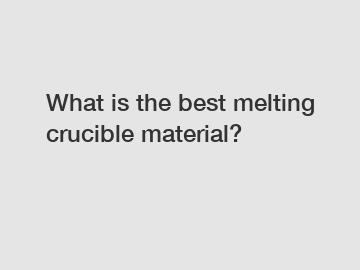What is the best melting crucible material?
What is the best melting crucible material?
Melting crucibles are crucial tools used in metal casting and melting processes. They play a significant role in determining the quality of the final product, as they directly influence heat transfer and the overall melting process. When it comes to choosing the best melting crucible material, several factors need to be taken into consideration, including temperature resistance, corrosion resistance, cost, and specific application requirements. In this article, we will explore various materials commonly used for melting crucibles, their advantages, and their limitations. .
1. Graphite Crucibles:

Graphite crucibles are widely used in various industries due to their excellent temperature resistance. They can withstand high temperatures up to 3000°C (5432°F) without any significant deterioration. Graphite is also known for its excellent thermal conductivity, which ensures efficient heat transfer during the metal melting process. Moreover, graphite crucibles have good resistance against thermal shock, allowing them to endure extreme temperature changes without cracking. However, graphite crucibles are not suitable for melting certain metals, such as iron and its alloys, as they tend to react with carbon and cause contamination.
2. Clay Crucibles:
Clay crucibles are a traditional and cost-effective choice for small-scale metal melting applications. They are made from refractory clay materials, such as fire clay or kaolin, mixed with a binder. Clay crucibles can withstand moderate temperatures up to 1300°C (2372°F), making them suitable for melting non-ferrous metals like gold, silver, and copper. However, clay crucibles have limited resistance to high temperatures and may crack or deteriorate when exposed to extreme heat. They also require careful handling to prevent breakage.
3. Silicon Carbide Crucibles:
Silicon carbide crucibles are popularly used for melting alloys and metals at high temperatures. They offer excellent thermal conductivity and have a high resistance to chemical erosion, making them suitable for melting reactive metals and alloys, including titanium and aluminum. Silicon carbide crucibles can withstand temperatures up to 1600°C (2912°F) and have good resistance against thermal shock. However, they are comparatively more expensive than graphite or clay crucibles.
4. Ceramic Crucibles:
Ceramic crucibles, made from various types of ceramics like alumina or zirconia, are known for their high resistance to temperature and chemical corrosion. They can withstand temperatures ranging from 1400°C to 1800°C (2552°F to 3272°F), depending on the type of ceramic used. Ceramic crucibles offer excellent resistance to cracking and erosion caused by chemicals, making them suitable for a wide range of applications. However, ceramic crucibles can be brittle and may break if mishandled or exposed to rapid temperature changes. .
In conclusion, the choice of the best melting crucible material depends on the specific requirements of the melting process. Graphite crucibles, with their exceptional temperature resistance and thermal conductivity, are commonly used in various industries. Clay crucibles provide a cost-effective option for small-scale applications but have limitations in terms of temperature resistance. Silicon carbide crucibles are ideal for melting reactive metals and alloys, while ceramic crucibles offer excellent resistance to high temperatures and chemical corrosion. It is essential to carefully consider factors such as temperature range, material compatibility, and budgetary constraints when selecting the appropriate melting crucible material.
Are you interested in learning more about How is Graphite Block Made?, carbon artificial graphite block, Lianjing Carbon? Contact us today to secure an expert consultation!
106
0
0


Comments
All Comments (0)